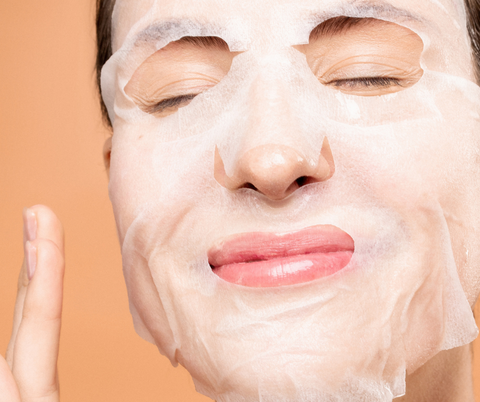Guide to Face Masks
After your skin has gone through the thorough processes of cleansing and exfoliating, it deserves a quick break to relax and absorb the ingredient-packed goodness of a mask. Face masks are the skincare staple for supple, radiant, glowing skin.
So, what exactly are masks, and where do they fall in the order of your skincare routine? In this guide we uncover just that, plus the different types of face masks available and which masks are best for your skin type.
What You'll Learn In This Blog
- What are Face Masks?
- 5 Different Types of Face Masks
- Where Do Face Masks Fall in Your Skincare Routine
- Face Masks for Different Skin Types
What are Face Masks?
Skincare has come so far. All of a sudden, a night cream is no longer the highlight of the skincare experience. If you’ve held a face mask product and wondered “What is this? What does it do?” you’re not alone.
Face masks come in various forms – clay, face sheets, facial creams. Each mask features various ingredients that deliver a number of skin benefits including hydration and nourishment. Dr. Nikhil Dhingra of New York’s Spring Street Dermatology highlighted the benefits of face sheets. Dr. Dhingra emphasized that face masks “deliver an intensive burst of nourishing and therapeutic skin care ingredients in a highly concentrated form.”
Masks rejuvenate the skin of nutrients that may have been sloughed off during the cleansing and exfoliating process. Think of masks as a recovery drink after a long run - it gives your skin the hydration it needs in a quick, efficient way.
5 Different Types of Face Masks
Face masks have evolved through the years. In 2021, there are roughly 7 types of face masks that can target various skin concerns. Sure it seems a bit excessive, but you won’t have to use them all to achieve that natural glow. Let’s learn about each one to start the process of finding the right face mask for you.
Sheet Masks

The sheet mask is one of the safest facial mask options. Infused with highly-concentrated serum, the face sheet mask offers instant relief when put on. While other masks target specific skin concerns, sheet masks can be used for multiple purposes - hydrating, anti-ageing, and calming skin sensitivity.
Clay Masks

Also known as mud masks, this type of mask is intense. Clay masks[NL4] often use bentonite and kaolin clay - both have components that target toxins and impurities in the skin. A little caveat - clay masks can be drying, so err on the safe side if you have dry skin.
Peel Off Masks or Charcoal Masks

With peel-off masks, you get the benefits of cleansing and exfoliation in one. Popular peel-off masks have charcoal components in them, so you can trust them to suck the dirt out of your skin.
Cream Masks

Ahh, cream masks. Heaven in a small tub. Featuring a gentle cream combined with brightening and hydrating ingredients, adding this to your face at night will leave you with soft, supple, glowing skin in the morning.
Gel Masks

Another skin product inspired by the Asian skin care routines, gel masks deliver a cooling, soothing effect for dry, sensitive skin.
Where Do Face Masks Fall In Your Routine?
The golden question (and where skincare can start to become tricky). First, identify what type of mask you are going to use.
If you’re using clay, charcoal, or peel-off masks, use the mask after cleansing but before you do the other steps to your routine. Typically, it’s safe to wear a mask after exfoliation – as long as the mask isn’t also meant for exfoliation.
If you’re using cream, gel, or sheet masks, use your facial mask after all your skin care steps you have two options; first you can follow the same advice above, adding a mask after cleansing (and exfoliating if it’s that time in the week) but before other steps in your routine. Alternatively, you can apply it as the final step in your night-time skincare routine and leave on overnight.
Best Face Masks for Different Skin Types
Best Face Masks for Dry Skin
Are you dealing with dry, almost-flaky skin? Masks to the rescue! Dr. Joshua Zeichner from Mount Sinai Hospital in New York highlights the benefits of face masks to dry skin. He said “hydrating masks are usually rich in ingredients like hyaluronic acid, which provide a plumping effect without causing any harm to the outer skin layer.”
If you’re looking for face masks for dry skin, search for masks with hydrating ingredients like glycerin, salicylic acid, hyaluronic acid, and salicylic acid.
Best Face Masks for Combination Skin
Choosing a face mask for combination skin can be tricky. But here’s the trick - choose an oil-free hydrating mask, and pair it with a face mask that addresses specific skin concerns (e.g. face masks for anti-ageing, brightening face masks, pore-minimizing face masks.)
We Recommend:

L’Occitane’s soothing face mask is a great option for dry and oily skin. It is enriched with freshly picked blackcurrants from the Ardèche, which is rich in magnesium and calcium - minerals essential for the skin to function at its best.
Best Face Masks for Sensitive Skin
If you’re one of those who have sensitive skin, an extra check on ingredients is a must before jumping on the masks trend. The best face masks for sensitive skin should have anti-inflammatory properties, and ingredients that soften the skin in a gentle way.
We Recommend:
Best Face Masks for Oily Skin
If your face is producing more sebum than normal, you should not just look for hydrating masks, but for detoxifying and renewing masks as well.

Adding a facial mask to your skincare routine is a must! You’ll be amazed at how plump, youthful and glowing your skin will look and feel after applying.
Need some help putting together the best skincare routine for your skin type? Try our skin quiz!








